Organisational Behaviour: Influence of Culture, Politics & Power
VerifiedAdded on 2023/06/16
|16
|4650
|141
Report
AI Summary
This report provides an analysis of organisational behaviour within the context of Tesco, examining the influence of culture, politics, and power on individual and team performance. It evaluates content and process theories of motivation, including Maslow's hierarchy of needs and Vroom's expectancy theory, and explores how motivational techniques enable goal achievement. The report also differentiates between effective and ineffective teams, analysing relevant team and group development theories to support cooperation. Furthermore, it applies concepts and philosophies of organisational behaviour to a given business situation, critically evaluating their relevance in improving business performance and productivity, highlighting the interdependence of culture, politics, power, and motivation in fostering a positive work environment and achieving organisational success. Desklib provides access to similar solved assignments and past papers for students.
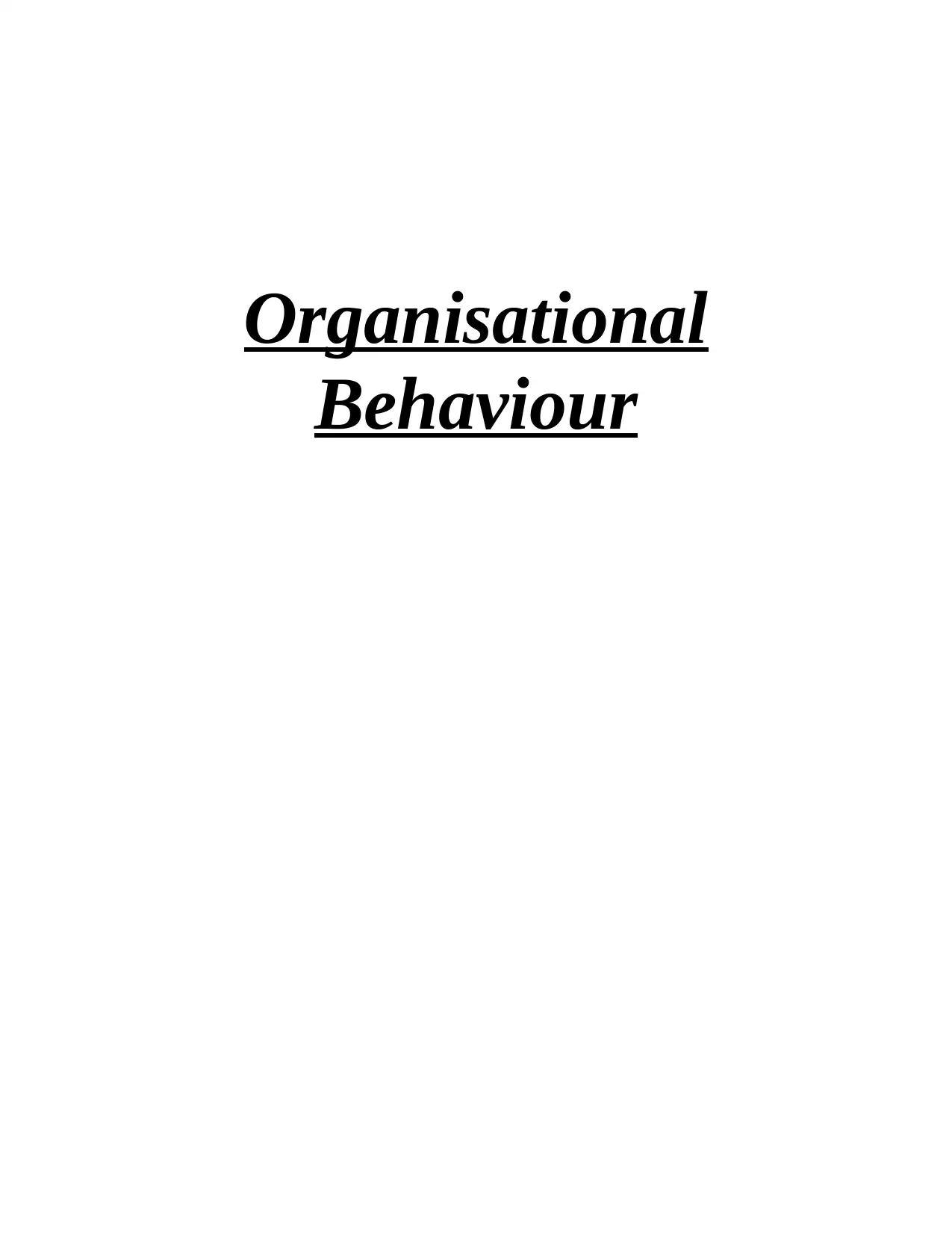
Organisational
Behaviour
Behaviour
Paraphrase This Document
Need a fresh take? Get an instant paraphrase of this document with our AI Paraphraser
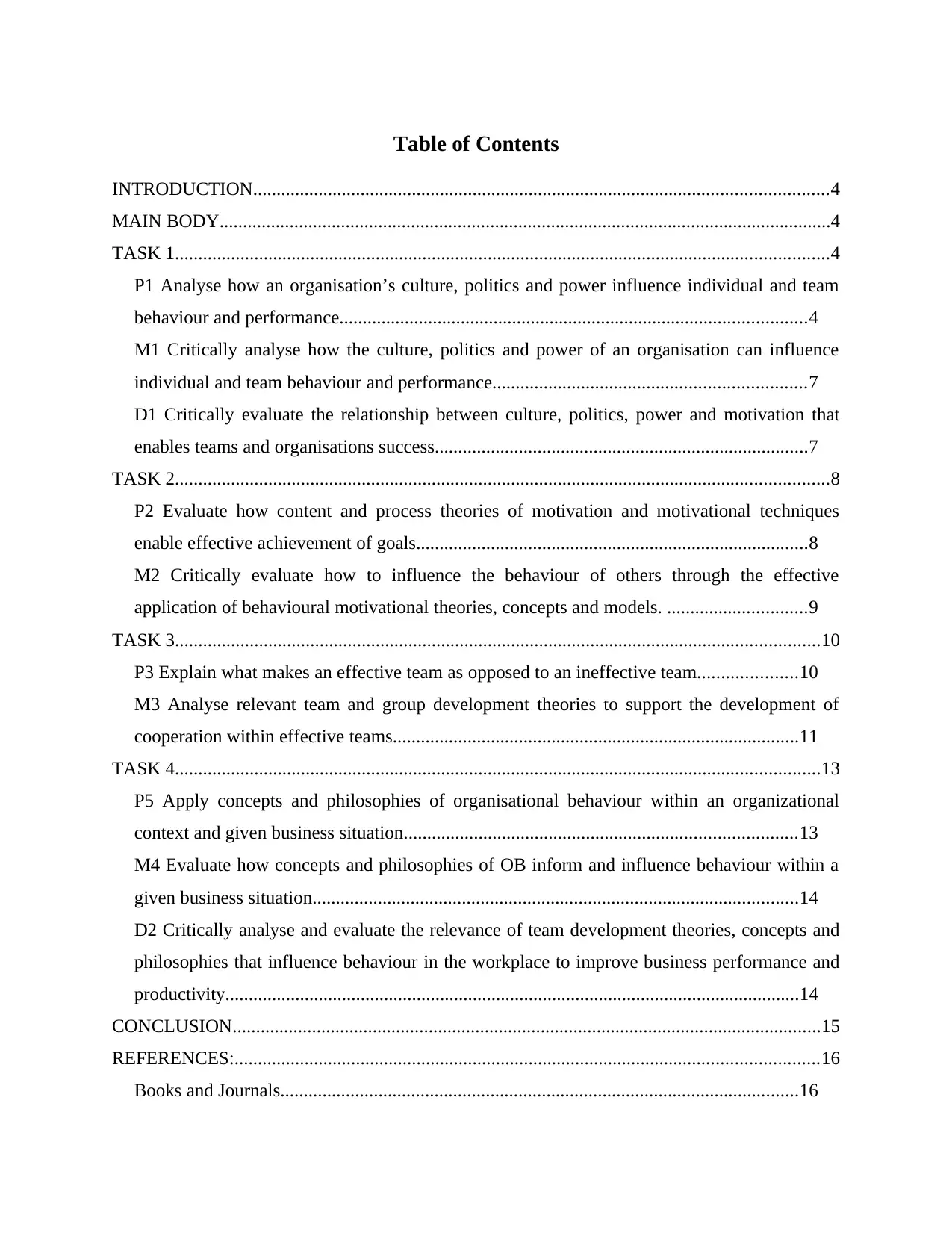
Table of Contents
INTRODUCTION...........................................................................................................................4
MAIN BODY...................................................................................................................................4
TASK 1............................................................................................................................................4
P1 Analyse how an organisation’s culture, politics and power influence individual and team
behaviour and performance....................................................................................................4
M1 Critically analyse how the culture, politics and power of an organisation can influence
individual and team behaviour and performance...................................................................7
D1 Critically evaluate the relationship between culture, politics, power and motivation that
enables teams and organisations success................................................................................7
TASK 2............................................................................................................................................8
P2 Evaluate how content and process theories of motivation and motivational techniques
enable effective achievement of goals....................................................................................8
M2 Critically evaluate how to influence the behaviour of others through the effective
application of behavioural motivational theories, concepts and models. ..............................9
TASK 3..........................................................................................................................................10
P3 Explain what makes an effective team as opposed to an ineffective team.....................10
M3 Analyse relevant team and group development theories to support the development of
cooperation within effective teams.......................................................................................11
TASK 4..........................................................................................................................................13
P5 Apply concepts and philosophies of organisational behaviour within an organizational
context and given business situation....................................................................................13
M4 Evaluate how concepts and philosophies of OB inform and influence behaviour within a
given business situation........................................................................................................14
D2 Critically analyse and evaluate the relevance of team development theories, concepts and
philosophies that influence behaviour in the workplace to improve business performance and
productivity...........................................................................................................................14
CONCLUSION..............................................................................................................................15
REFERENCES:.............................................................................................................................16
Books and Journals...............................................................................................................16
INTRODUCTION...........................................................................................................................4
MAIN BODY...................................................................................................................................4
TASK 1............................................................................................................................................4
P1 Analyse how an organisation’s culture, politics and power influence individual and team
behaviour and performance....................................................................................................4
M1 Critically analyse how the culture, politics and power of an organisation can influence
individual and team behaviour and performance...................................................................7
D1 Critically evaluate the relationship between culture, politics, power and motivation that
enables teams and organisations success................................................................................7
TASK 2............................................................................................................................................8
P2 Evaluate how content and process theories of motivation and motivational techniques
enable effective achievement of goals....................................................................................8
M2 Critically evaluate how to influence the behaviour of others through the effective
application of behavioural motivational theories, concepts and models. ..............................9
TASK 3..........................................................................................................................................10
P3 Explain what makes an effective team as opposed to an ineffective team.....................10
M3 Analyse relevant team and group development theories to support the development of
cooperation within effective teams.......................................................................................11
TASK 4..........................................................................................................................................13
P5 Apply concepts and philosophies of organisational behaviour within an organizational
context and given business situation....................................................................................13
M4 Evaluate how concepts and philosophies of OB inform and influence behaviour within a
given business situation........................................................................................................14
D2 Critically analyse and evaluate the relevance of team development theories, concepts and
philosophies that influence behaviour in the workplace to improve business performance and
productivity...........................................................................................................................14
CONCLUSION..............................................................................................................................15
REFERENCES:.............................................................................................................................16
Books and Journals...............................................................................................................16
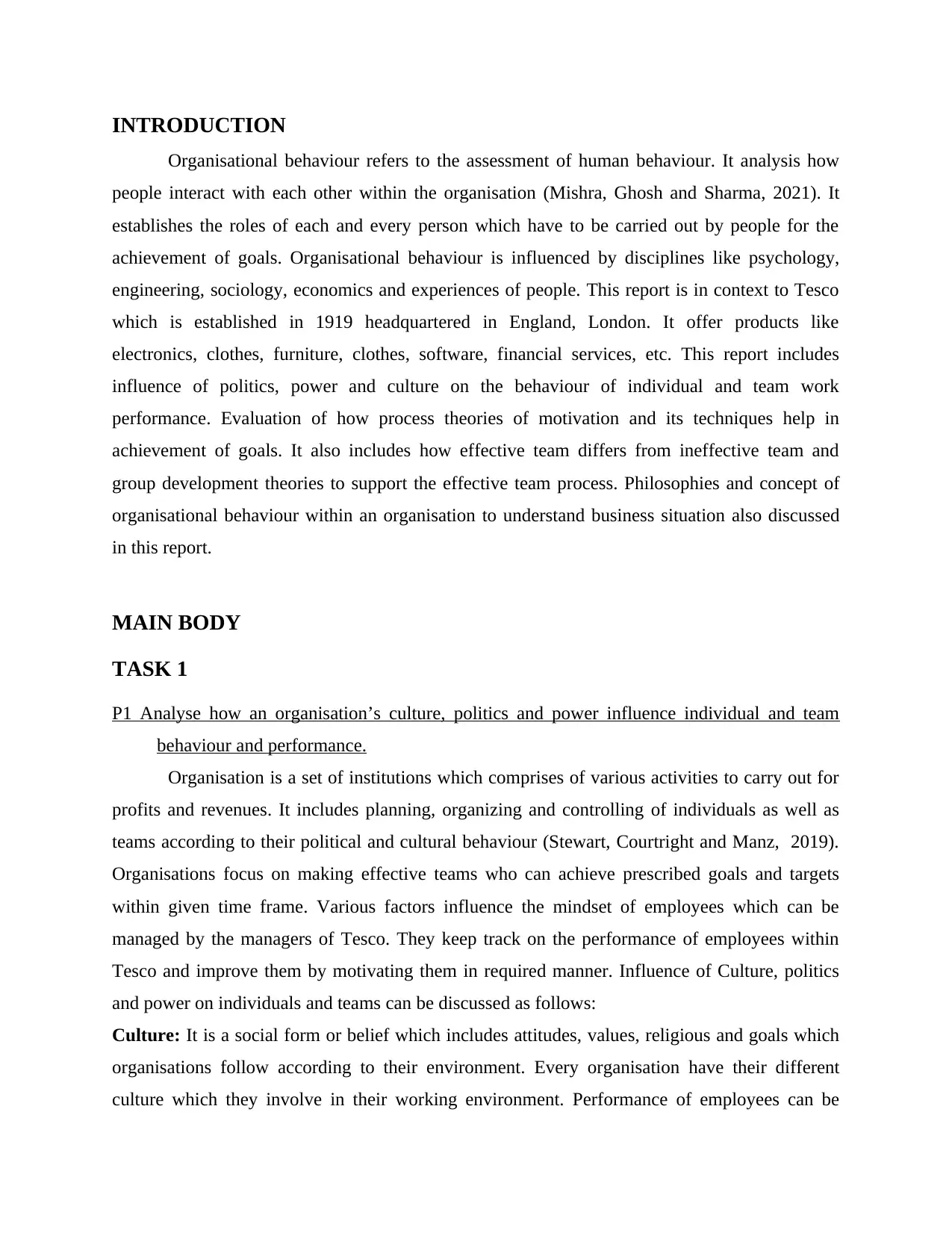
INTRODUCTION
Organisational behaviour refers to the assessment of human behaviour. It analysis how
people interact with each other within the organisation (Mishra, Ghosh and Sharma, 2021). It
establishes the roles of each and every person which have to be carried out by people for the
achievement of goals. Organisational behaviour is influenced by disciplines like psychology,
engineering, sociology, economics and experiences of people. This report is in context to Tesco
which is established in 1919 headquartered in England, London. It offer products like
electronics, clothes, furniture, clothes, software, financial services, etc. This report includes
influence of politics, power and culture on the behaviour of individual and team work
performance. Evaluation of how process theories of motivation and its techniques help in
achievement of goals. It also includes how effective team differs from ineffective team and
group development theories to support the effective team process. Philosophies and concept of
organisational behaviour within an organisation to understand business situation also discussed
in this report.
MAIN BODY
TASK 1
P1 Analyse how an organisation’s culture, politics and power influence individual and team
behaviour and performance.
Organisation is a set of institutions which comprises of various activities to carry out for
profits and revenues. It includes planning, organizing and controlling of individuals as well as
teams according to their political and cultural behaviour (Stewart, Courtright and Manz, 2019).
Organisations focus on making effective teams who can achieve prescribed goals and targets
within given time frame. Various factors influence the mindset of employees which can be
managed by the managers of Tesco. They keep track on the performance of employees within
Tesco and improve them by motivating them in required manner. Influence of Culture, politics
and power on individuals and teams can be discussed as follows:
Culture: It is a social form or belief which includes attitudes, values, religious and goals which
organisations follow according to their environment. Every organisation have their different
culture which they involve in their working environment. Performance of employees can be
Organisational behaviour refers to the assessment of human behaviour. It analysis how
people interact with each other within the organisation (Mishra, Ghosh and Sharma, 2021). It
establishes the roles of each and every person which have to be carried out by people for the
achievement of goals. Organisational behaviour is influenced by disciplines like psychology,
engineering, sociology, economics and experiences of people. This report is in context to Tesco
which is established in 1919 headquartered in England, London. It offer products like
electronics, clothes, furniture, clothes, software, financial services, etc. This report includes
influence of politics, power and culture on the behaviour of individual and team work
performance. Evaluation of how process theories of motivation and its techniques help in
achievement of goals. It also includes how effective team differs from ineffective team and
group development theories to support the effective team process. Philosophies and concept of
organisational behaviour within an organisation to understand business situation also discussed
in this report.
MAIN BODY
TASK 1
P1 Analyse how an organisation’s culture, politics and power influence individual and team
behaviour and performance.
Organisation is a set of institutions which comprises of various activities to carry out for
profits and revenues. It includes planning, organizing and controlling of individuals as well as
teams according to their political and cultural behaviour (Stewart, Courtright and Manz, 2019).
Organisations focus on making effective teams who can achieve prescribed goals and targets
within given time frame. Various factors influence the mindset of employees which can be
managed by the managers of Tesco. They keep track on the performance of employees within
Tesco and improve them by motivating them in required manner. Influence of Culture, politics
and power on individuals and teams can be discussed as follows:
Culture: It is a social form or belief which includes attitudes, values, religious and goals which
organisations follow according to their environment. Every organisation have their different
culture which they involve in their working environment. Performance of employees can be
⊘ This is a preview!⊘
Do you want full access?
Subscribe today to unlock all pages.

Trusted by 1+ million students worldwide
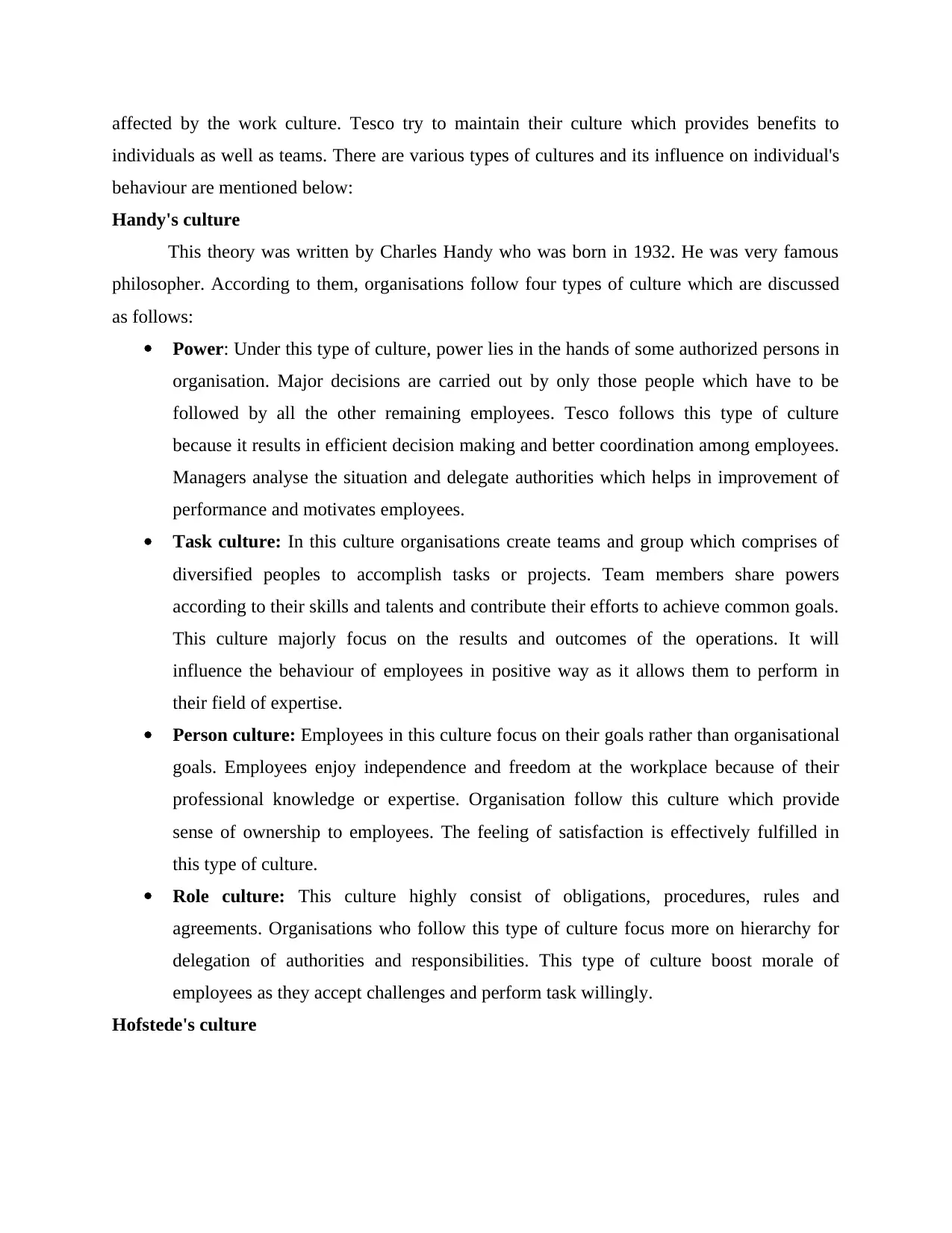
affected by the work culture. Tesco try to maintain their culture which provides benefits to
individuals as well as teams. There are various types of cultures and its influence on individual's
behaviour are mentioned below:
Handy's culture
This theory was written by Charles Handy who was born in 1932. He was very famous
philosopher. According to them, organisations follow four types of culture which are discussed
as follows:
Power: Under this type of culture, power lies in the hands of some authorized persons in
organisation. Major decisions are carried out by only those people which have to be
followed by all the other remaining employees. Tesco follows this type of culture
because it results in efficient decision making and better coordination among employees.
Managers analyse the situation and delegate authorities which helps in improvement of
performance and motivates employees.
Task culture: In this culture organisations create teams and group which comprises of
diversified peoples to accomplish tasks or projects. Team members share powers
according to their skills and talents and contribute their efforts to achieve common goals.
This culture majorly focus on the results and outcomes of the operations. It will
influence the behaviour of employees in positive way as it allows them to perform in
their field of expertise.
Person culture: Employees in this culture focus on their goals rather than organisational
goals. Employees enjoy independence and freedom at the workplace because of their
professional knowledge or expertise. Organisation follow this culture which provide
sense of ownership to employees. The feeling of satisfaction is effectively fulfilled in
this type of culture.
Role culture: This culture highly consist of obligations, procedures, rules and
agreements. Organisations who follow this type of culture focus more on hierarchy for
delegation of authorities and responsibilities. This type of culture boost morale of
employees as they accept challenges and perform task willingly.
Hofstede's culture
individuals as well as teams. There are various types of cultures and its influence on individual's
behaviour are mentioned below:
Handy's culture
This theory was written by Charles Handy who was born in 1932. He was very famous
philosopher. According to them, organisations follow four types of culture which are discussed
as follows:
Power: Under this type of culture, power lies in the hands of some authorized persons in
organisation. Major decisions are carried out by only those people which have to be
followed by all the other remaining employees. Tesco follows this type of culture
because it results in efficient decision making and better coordination among employees.
Managers analyse the situation and delegate authorities which helps in improvement of
performance and motivates employees.
Task culture: In this culture organisations create teams and group which comprises of
diversified peoples to accomplish tasks or projects. Team members share powers
according to their skills and talents and contribute their efforts to achieve common goals.
This culture majorly focus on the results and outcomes of the operations. It will
influence the behaviour of employees in positive way as it allows them to perform in
their field of expertise.
Person culture: Employees in this culture focus on their goals rather than organisational
goals. Employees enjoy independence and freedom at the workplace because of their
professional knowledge or expertise. Organisation follow this culture which provide
sense of ownership to employees. The feeling of satisfaction is effectively fulfilled in
this type of culture.
Role culture: This culture highly consist of obligations, procedures, rules and
agreements. Organisations who follow this type of culture focus more on hierarchy for
delegation of authorities and responsibilities. This type of culture boost morale of
employees as they accept challenges and perform task willingly.
Hofstede's culture
Paraphrase This Document
Need a fresh take? Get an instant paraphrase of this document with our AI Paraphraser
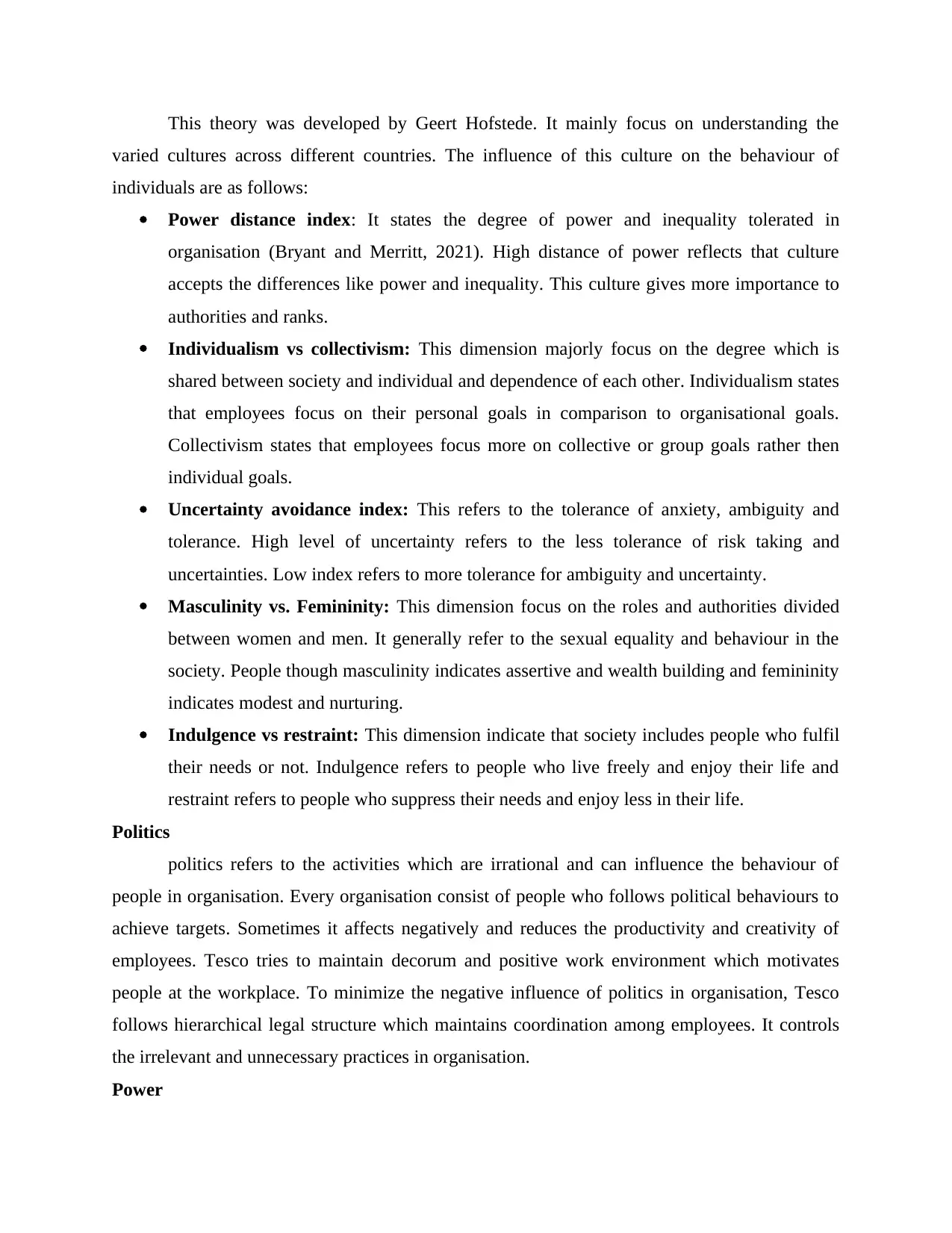
This theory was developed by Geert Hofstede. It mainly focus on understanding the
varied cultures across different countries. The influence of this culture on the behaviour of
individuals are as follows:
Power distance index: It states the degree of power and inequality tolerated in
organisation (Bryant and Merritt, 2021). High distance of power reflects that culture
accepts the differences like power and inequality. This culture gives more importance to
authorities and ranks.
Individualism vs collectivism: This dimension majorly focus on the degree which is
shared between society and individual and dependence of each other. Individualism states
that employees focus on their personal goals in comparison to organisational goals.
Collectivism states that employees focus more on collective or group goals rather then
individual goals.
Uncertainty avoidance index: This refers to the tolerance of anxiety, ambiguity and
tolerance. High level of uncertainty refers to the less tolerance of risk taking and
uncertainties. Low index refers to more tolerance for ambiguity and uncertainty.
Masculinity vs. Femininity: This dimension focus on the roles and authorities divided
between women and men. It generally refer to the sexual equality and behaviour in the
society. People though masculinity indicates assertive and wealth building and femininity
indicates modest and nurturing.
Indulgence vs restraint: This dimension indicate that society includes people who fulfil
their needs or not. Indulgence refers to people who live freely and enjoy their life and
restraint refers to people who suppress their needs and enjoy less in their life.
Politics
politics refers to the activities which are irrational and can influence the behaviour of
people in organisation. Every organisation consist of people who follows political behaviours to
achieve targets. Sometimes it affects negatively and reduces the productivity and creativity of
employees. Tesco tries to maintain decorum and positive work environment which motivates
people at the workplace. To minimize the negative influence of politics in organisation, Tesco
follows hierarchical legal structure which maintains coordination among employees. It controls
the irrelevant and unnecessary practices in organisation.
Power
varied cultures across different countries. The influence of this culture on the behaviour of
individuals are as follows:
Power distance index: It states the degree of power and inequality tolerated in
organisation (Bryant and Merritt, 2021). High distance of power reflects that culture
accepts the differences like power and inequality. This culture gives more importance to
authorities and ranks.
Individualism vs collectivism: This dimension majorly focus on the degree which is
shared between society and individual and dependence of each other. Individualism states
that employees focus on their personal goals in comparison to organisational goals.
Collectivism states that employees focus more on collective or group goals rather then
individual goals.
Uncertainty avoidance index: This refers to the tolerance of anxiety, ambiguity and
tolerance. High level of uncertainty refers to the less tolerance of risk taking and
uncertainties. Low index refers to more tolerance for ambiguity and uncertainty.
Masculinity vs. Femininity: This dimension focus on the roles and authorities divided
between women and men. It generally refer to the sexual equality and behaviour in the
society. People though masculinity indicates assertive and wealth building and femininity
indicates modest and nurturing.
Indulgence vs restraint: This dimension indicate that society includes people who fulfil
their needs or not. Indulgence refers to people who live freely and enjoy their life and
restraint refers to people who suppress their needs and enjoy less in their life.
Politics
politics refers to the activities which are irrational and can influence the behaviour of
people in organisation. Every organisation consist of people who follows political behaviours to
achieve targets. Sometimes it affects negatively and reduces the productivity and creativity of
employees. Tesco tries to maintain decorum and positive work environment which motivates
people at the workplace. To minimize the negative influence of politics in organisation, Tesco
follows hierarchical legal structure which maintains coordination among employees. It controls
the irrelevant and unnecessary practices in organisation.
Power
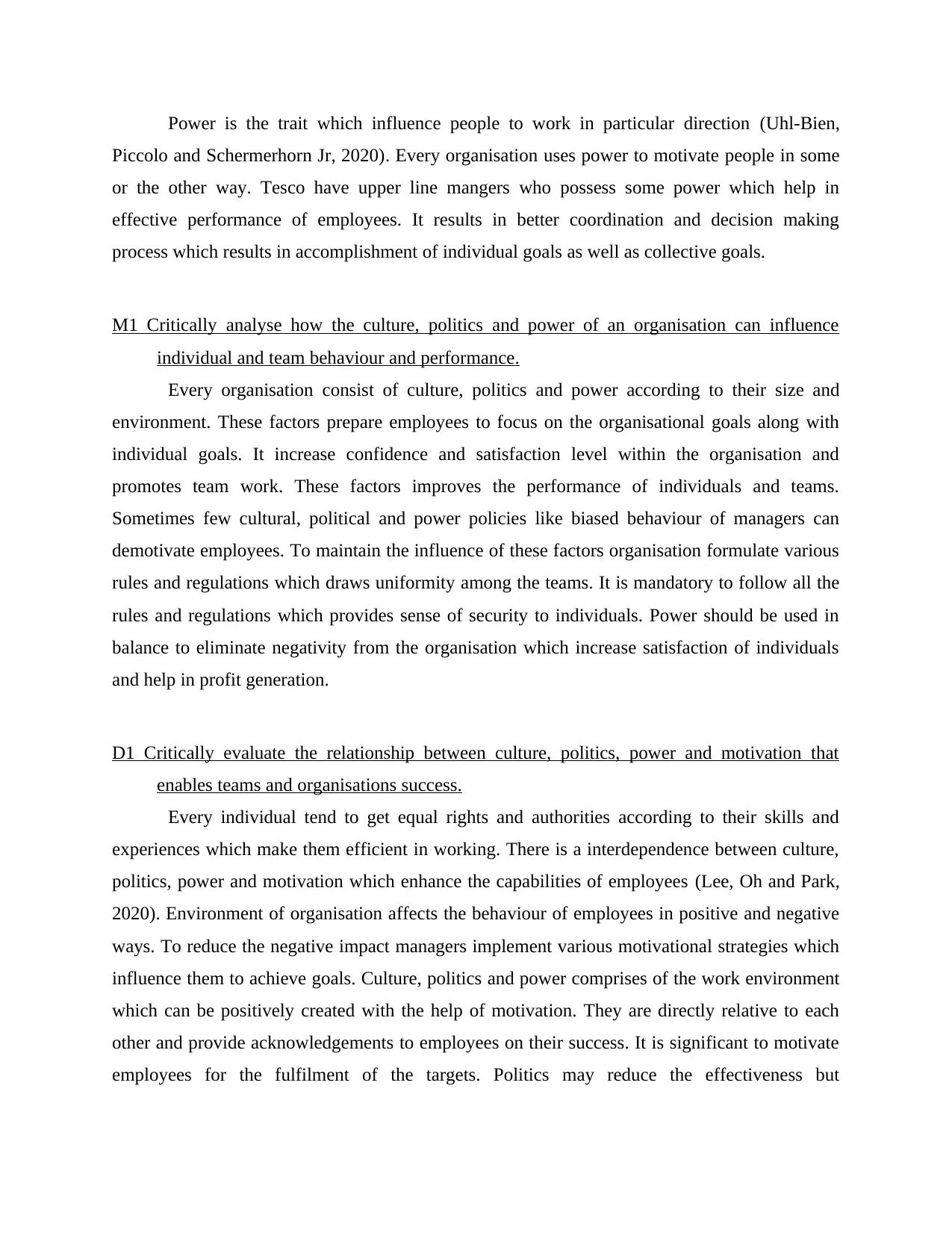
Power is the trait which influence people to work in particular direction (Uhl-Bien,
Piccolo and Schermerhorn Jr, 2020). Every organisation uses power to motivate people in some
or the other way. Tesco have upper line mangers who possess some power which help in
effective performance of employees. It results in better coordination and decision making
process which results in accomplishment of individual goals as well as collective goals.
M1 Critically analyse how the culture, politics and power of an organisation can influence
individual and team behaviour and performance.
Every organisation consist of culture, politics and power according to their size and
environment. These factors prepare employees to focus on the organisational goals along with
individual goals. It increase confidence and satisfaction level within the organisation and
promotes team work. These factors improves the performance of individuals and teams.
Sometimes few cultural, political and power policies like biased behaviour of managers can
demotivate employees. To maintain the influence of these factors organisation formulate various
rules and regulations which draws uniformity among the teams. It is mandatory to follow all the
rules and regulations which provides sense of security to individuals. Power should be used in
balance to eliminate negativity from the organisation which increase satisfaction of individuals
and help in profit generation.
D1 Critically evaluate the relationship between culture, politics, power and motivation that
enables teams and organisations success.
Every individual tend to get equal rights and authorities according to their skills and
experiences which make them efficient in working. There is a interdependence between culture,
politics, power and motivation which enhance the capabilities of employees (Lee, Oh and Park,
2020). Environment of organisation affects the behaviour of employees in positive and negative
ways. To reduce the negative impact managers implement various motivational strategies which
influence them to achieve goals. Culture, politics and power comprises of the work environment
which can be positively created with the help of motivation. They are directly relative to each
other and provide acknowledgements to employees on their success. It is significant to motivate
employees for the fulfilment of the targets. Politics may reduce the effectiveness but
Piccolo and Schermerhorn Jr, 2020). Every organisation uses power to motivate people in some
or the other way. Tesco have upper line mangers who possess some power which help in
effective performance of employees. It results in better coordination and decision making
process which results in accomplishment of individual goals as well as collective goals.
M1 Critically analyse how the culture, politics and power of an organisation can influence
individual and team behaviour and performance.
Every organisation consist of culture, politics and power according to their size and
environment. These factors prepare employees to focus on the organisational goals along with
individual goals. It increase confidence and satisfaction level within the organisation and
promotes team work. These factors improves the performance of individuals and teams.
Sometimes few cultural, political and power policies like biased behaviour of managers can
demotivate employees. To maintain the influence of these factors organisation formulate various
rules and regulations which draws uniformity among the teams. It is mandatory to follow all the
rules and regulations which provides sense of security to individuals. Power should be used in
balance to eliminate negativity from the organisation which increase satisfaction of individuals
and help in profit generation.
D1 Critically evaluate the relationship between culture, politics, power and motivation that
enables teams and organisations success.
Every individual tend to get equal rights and authorities according to their skills and
experiences which make them efficient in working. There is a interdependence between culture,
politics, power and motivation which enhance the capabilities of employees (Lee, Oh and Park,
2020). Environment of organisation affects the behaviour of employees in positive and negative
ways. To reduce the negative impact managers implement various motivational strategies which
influence them to achieve goals. Culture, politics and power comprises of the work environment
which can be positively created with the help of motivation. They are directly relative to each
other and provide acknowledgements to employees on their success. It is significant to motivate
employees for the fulfilment of the targets. Politics may reduce the effectiveness but
⊘ This is a preview!⊘
Do you want full access?
Subscribe today to unlock all pages.

Trusted by 1+ million students worldwide
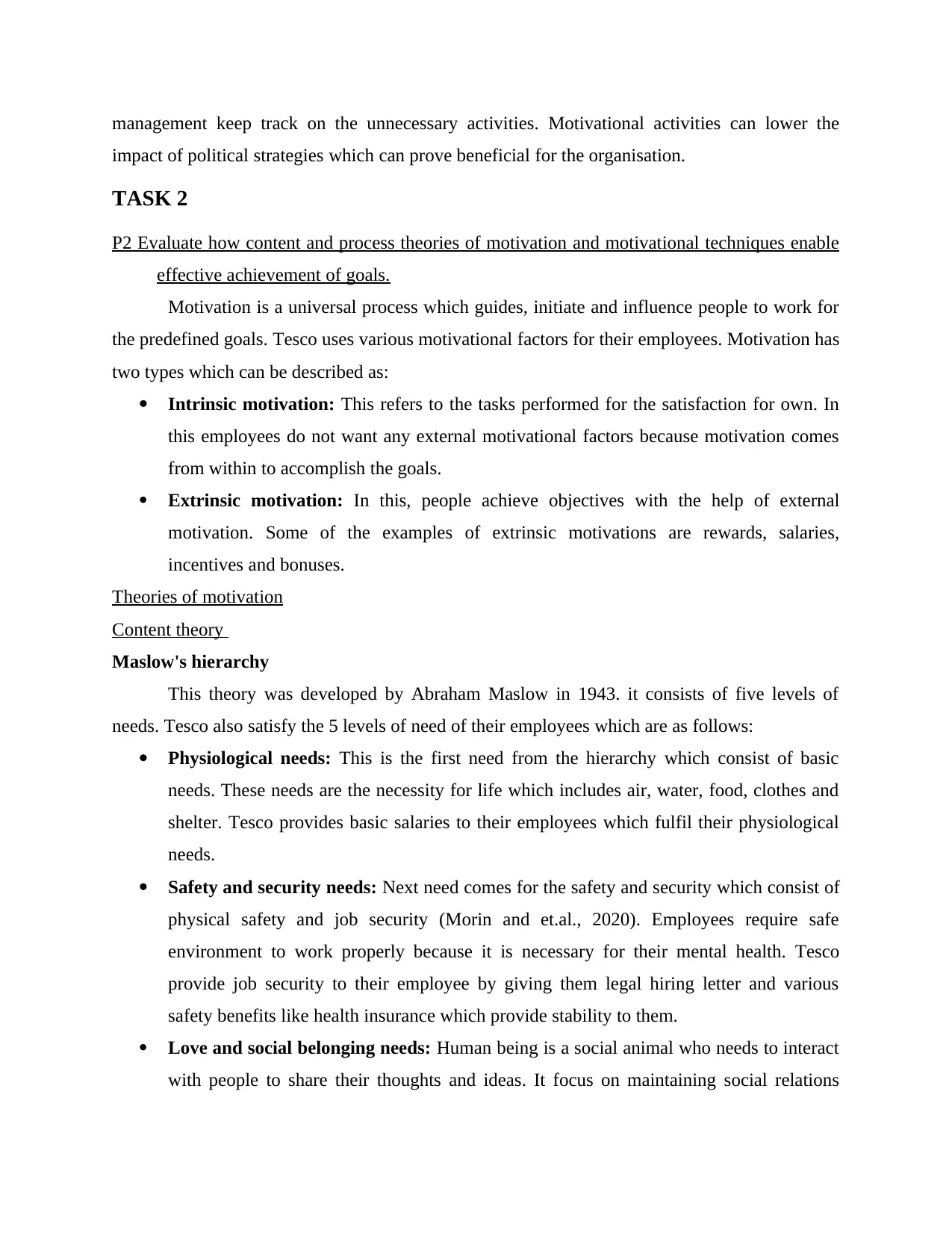
management keep track on the unnecessary activities. Motivational activities can lower the
impact of political strategies which can prove beneficial for the organisation.
TASK 2
P2 Evaluate how content and process theories of motivation and motivational techniques enable
effective achievement of goals.
Motivation is a universal process which guides, initiate and influence people to work for
the predefined goals. Tesco uses various motivational factors for their employees. Motivation has
two types which can be described as:
Intrinsic motivation: This refers to the tasks performed for the satisfaction for own. In
this employees do not want any external motivational factors because motivation comes
from within to accomplish the goals.
Extrinsic motivation: In this, people achieve objectives with the help of external
motivation. Some of the examples of extrinsic motivations are rewards, salaries,
incentives and bonuses.
Theories of motivation
Content theory
Maslow's hierarchy
This theory was developed by Abraham Maslow in 1943. it consists of five levels of
needs. Tesco also satisfy the 5 levels of need of their employees which are as follows:
Physiological needs: This is the first need from the hierarchy which consist of basic
needs. These needs are the necessity for life which includes air, water, food, clothes and
shelter. Tesco provides basic salaries to their employees which fulfil their physiological
needs.
Safety and security needs: Next need comes for the safety and security which consist of
physical safety and job security (Morin and et.al., 2020). Employees require safe
environment to work properly because it is necessary for their mental health. Tesco
provide job security to their employee by giving them legal hiring letter and various
safety benefits like health insurance which provide stability to them.
Love and social belonging needs: Human being is a social animal who needs to interact
with people to share their thoughts and ideas. It focus on maintaining social relations
impact of political strategies which can prove beneficial for the organisation.
TASK 2
P2 Evaluate how content and process theories of motivation and motivational techniques enable
effective achievement of goals.
Motivation is a universal process which guides, initiate and influence people to work for
the predefined goals. Tesco uses various motivational factors for their employees. Motivation has
two types which can be described as:
Intrinsic motivation: This refers to the tasks performed for the satisfaction for own. In
this employees do not want any external motivational factors because motivation comes
from within to accomplish the goals.
Extrinsic motivation: In this, people achieve objectives with the help of external
motivation. Some of the examples of extrinsic motivations are rewards, salaries,
incentives and bonuses.
Theories of motivation
Content theory
Maslow's hierarchy
This theory was developed by Abraham Maslow in 1943. it consists of five levels of
needs. Tesco also satisfy the 5 levels of need of their employees which are as follows:
Physiological needs: This is the first need from the hierarchy which consist of basic
needs. These needs are the necessity for life which includes air, water, food, clothes and
shelter. Tesco provides basic salaries to their employees which fulfil their physiological
needs.
Safety and security needs: Next need comes for the safety and security which consist of
physical safety and job security (Morin and et.al., 2020). Employees require safe
environment to work properly because it is necessary for their mental health. Tesco
provide job security to their employee by giving them legal hiring letter and various
safety benefits like health insurance which provide stability to them.
Love and social belonging needs: Human being is a social animal who needs to interact
with people to share their thoughts and ideas. It focus on maintaining social relations
Paraphrase This Document
Need a fresh take? Get an instant paraphrase of this document with our AI Paraphraser
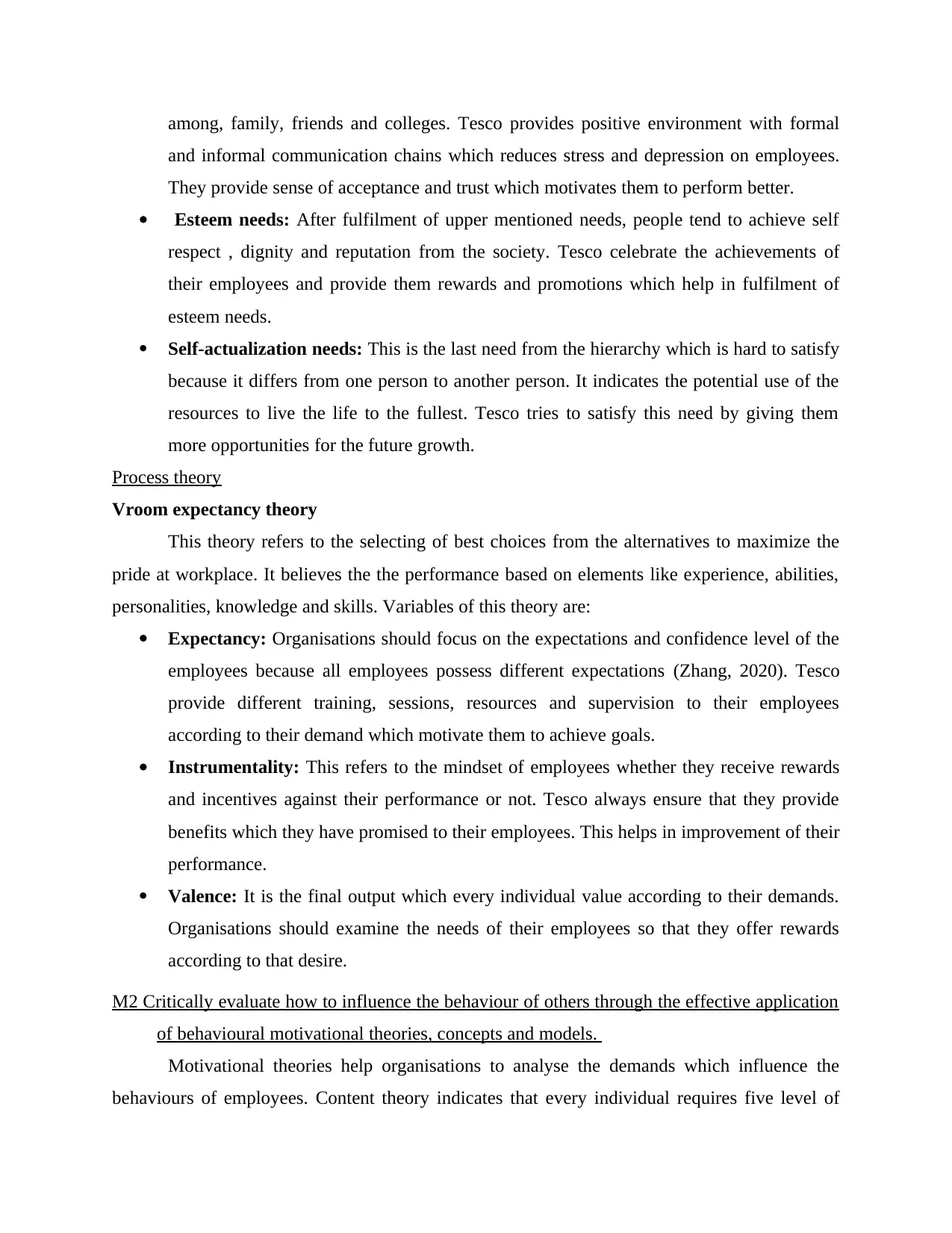
among, family, friends and colleges. Tesco provides positive environment with formal
and informal communication chains which reduces stress and depression on employees.
They provide sense of acceptance and trust which motivates them to perform better.
Esteem needs: After fulfilment of upper mentioned needs, people tend to achieve self
respect , dignity and reputation from the society. Tesco celebrate the achievements of
their employees and provide them rewards and promotions which help in fulfilment of
esteem needs.
Self-actualization needs: This is the last need from the hierarchy which is hard to satisfy
because it differs from one person to another person. It indicates the potential use of the
resources to live the life to the fullest. Tesco tries to satisfy this need by giving them
more opportunities for the future growth.
Process theory
Vroom expectancy theory
This theory refers to the selecting of best choices from the alternatives to maximize the
pride at workplace. It believes the the performance based on elements like experience, abilities,
personalities, knowledge and skills. Variables of this theory are:
Expectancy: Organisations should focus on the expectations and confidence level of the
employees because all employees possess different expectations (Zhang, 2020). Tesco
provide different training, sessions, resources and supervision to their employees
according to their demand which motivate them to achieve goals.
Instrumentality: This refers to the mindset of employees whether they receive rewards
and incentives against their performance or not. Tesco always ensure that they provide
benefits which they have promised to their employees. This helps in improvement of their
performance.
Valence: It is the final output which every individual value according to their demands.
Organisations should examine the needs of their employees so that they offer rewards
according to that desire.
M2 Critically evaluate how to influence the behaviour of others through the effective application
of behavioural motivational theories, concepts and models.
Motivational theories help organisations to analyse the demands which influence the
behaviours of employees. Content theory indicates that every individual requires five level of
and informal communication chains which reduces stress and depression on employees.
They provide sense of acceptance and trust which motivates them to perform better.
Esteem needs: After fulfilment of upper mentioned needs, people tend to achieve self
respect , dignity and reputation from the society. Tesco celebrate the achievements of
their employees and provide them rewards and promotions which help in fulfilment of
esteem needs.
Self-actualization needs: This is the last need from the hierarchy which is hard to satisfy
because it differs from one person to another person. It indicates the potential use of the
resources to live the life to the fullest. Tesco tries to satisfy this need by giving them
more opportunities for the future growth.
Process theory
Vroom expectancy theory
This theory refers to the selecting of best choices from the alternatives to maximize the
pride at workplace. It believes the the performance based on elements like experience, abilities,
personalities, knowledge and skills. Variables of this theory are:
Expectancy: Organisations should focus on the expectations and confidence level of the
employees because all employees possess different expectations (Zhang, 2020). Tesco
provide different training, sessions, resources and supervision to their employees
according to their demand which motivate them to achieve goals.
Instrumentality: This refers to the mindset of employees whether they receive rewards
and incentives against their performance or not. Tesco always ensure that they provide
benefits which they have promised to their employees. This helps in improvement of their
performance.
Valence: It is the final output which every individual value according to their demands.
Organisations should examine the needs of their employees so that they offer rewards
according to that desire.
M2 Critically evaluate how to influence the behaviour of others through the effective application
of behavioural motivational theories, concepts and models.
Motivational theories help organisations to analyse the demands which influence the
behaviours of employees. Content theory indicates that every individual requires five level of
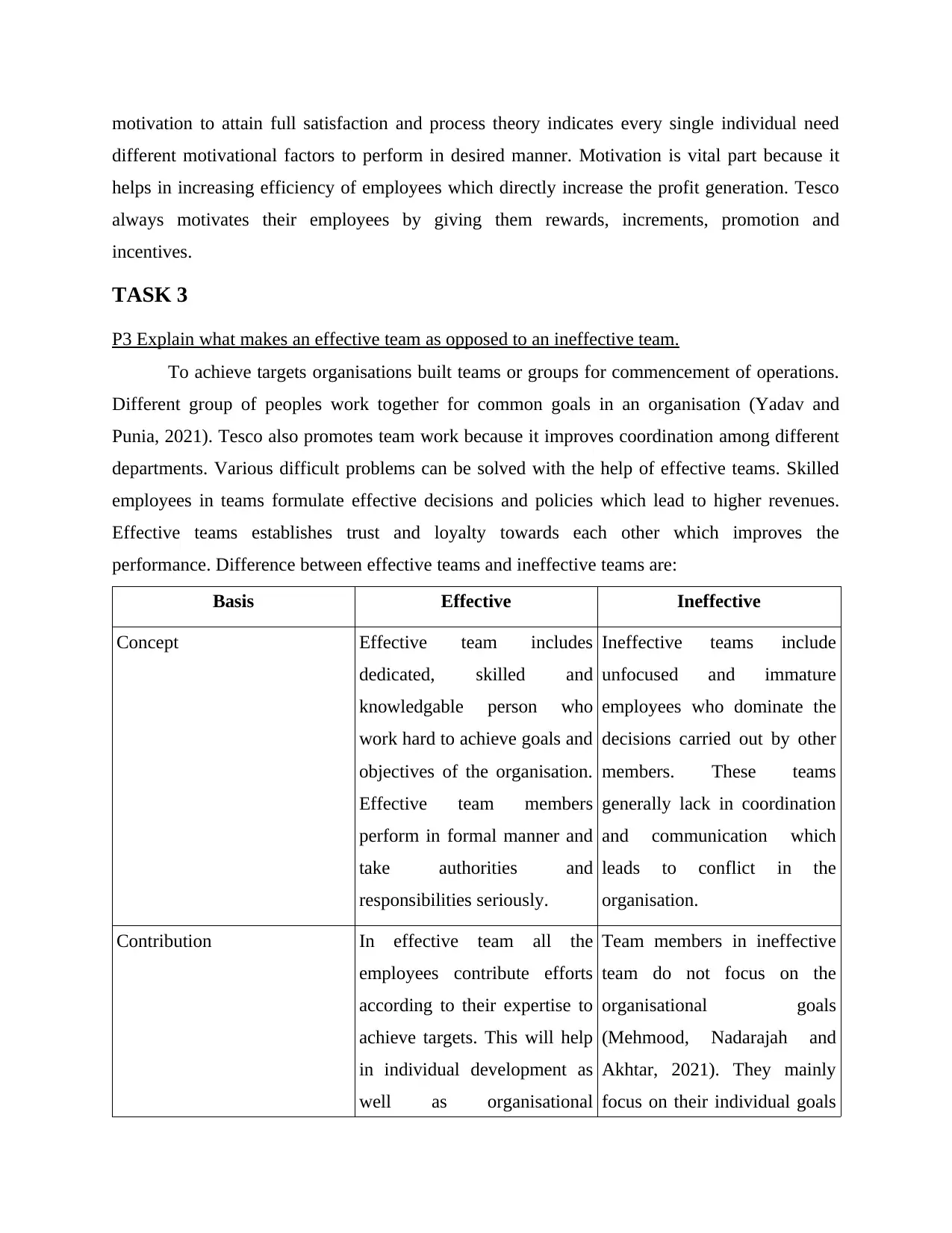
motivation to attain full satisfaction and process theory indicates every single individual need
different motivational factors to perform in desired manner. Motivation is vital part because it
helps in increasing efficiency of employees which directly increase the profit generation. Tesco
always motivates their employees by giving them rewards, increments, promotion and
incentives.
TASK 3
P3 Explain what makes an effective team as opposed to an ineffective team.
To achieve targets organisations built teams or groups for commencement of operations.
Different group of peoples work together for common goals in an organisation (Yadav and
Punia, 2021). Tesco also promotes team work because it improves coordination among different
departments. Various difficult problems can be solved with the help of effective teams. Skilled
employees in teams formulate effective decisions and policies which lead to higher revenues.
Effective teams establishes trust and loyalty towards each other which improves the
performance. Difference between effective teams and ineffective teams are:
Basis Effective Ineffective
Concept Effective team includes
dedicated, skilled and
knowledgable person who
work hard to achieve goals and
objectives of the organisation.
Effective team members
perform in formal manner and
take authorities and
responsibilities seriously.
Ineffective teams include
unfocused and immature
employees who dominate the
decisions carried out by other
members. These teams
generally lack in coordination
and communication which
leads to conflict in the
organisation.
Contribution In effective team all the
employees contribute efforts
according to their expertise to
achieve targets. This will help
in individual development as
well as organisational
Team members in ineffective
team do not focus on the
organisational goals
(Mehmood, Nadarajah and
Akhtar, 2021). They mainly
focus on their individual goals
different motivational factors to perform in desired manner. Motivation is vital part because it
helps in increasing efficiency of employees which directly increase the profit generation. Tesco
always motivates their employees by giving them rewards, increments, promotion and
incentives.
TASK 3
P3 Explain what makes an effective team as opposed to an ineffective team.
To achieve targets organisations built teams or groups for commencement of operations.
Different group of peoples work together for common goals in an organisation (Yadav and
Punia, 2021). Tesco also promotes team work because it improves coordination among different
departments. Various difficult problems can be solved with the help of effective teams. Skilled
employees in teams formulate effective decisions and policies which lead to higher revenues.
Effective teams establishes trust and loyalty towards each other which improves the
performance. Difference between effective teams and ineffective teams are:
Basis Effective Ineffective
Concept Effective team includes
dedicated, skilled and
knowledgable person who
work hard to achieve goals and
objectives of the organisation.
Effective team members
perform in formal manner and
take authorities and
responsibilities seriously.
Ineffective teams include
unfocused and immature
employees who dominate the
decisions carried out by other
members. These teams
generally lack in coordination
and communication which
leads to conflict in the
organisation.
Contribution In effective team all the
employees contribute efforts
according to their expertise to
achieve targets. This will help
in individual development as
well as organisational
Team members in ineffective
team do not focus on the
organisational goals
(Mehmood, Nadarajah and
Akhtar, 2021). They mainly
focus on their individual goals
⊘ This is a preview!⊘
Do you want full access?
Subscribe today to unlock all pages.

Trusted by 1+ million students worldwide
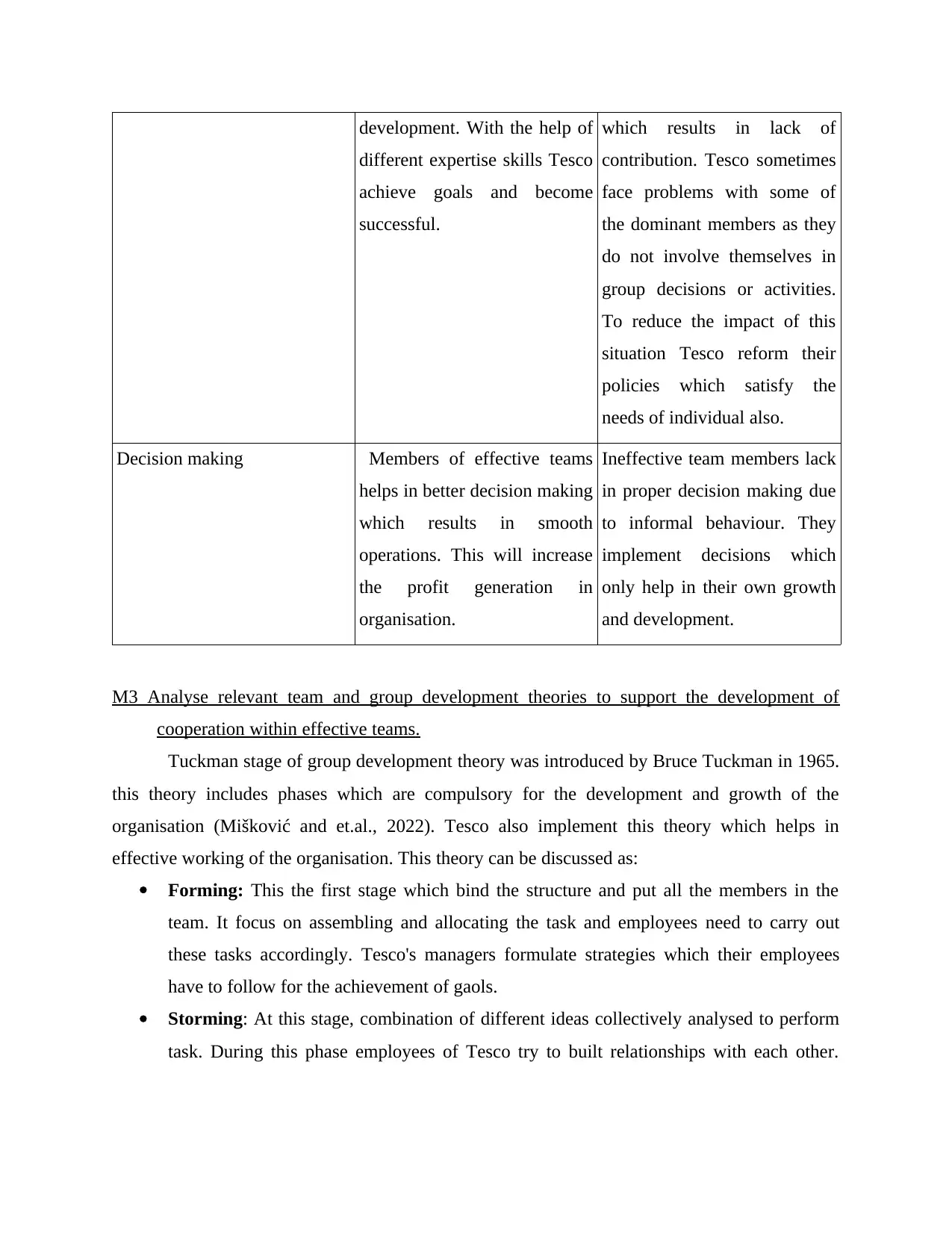
development. With the help of
different expertise skills Tesco
achieve goals and become
successful.
which results in lack of
contribution. Tesco sometimes
face problems with some of
the dominant members as they
do not involve themselves in
group decisions or activities.
To reduce the impact of this
situation Tesco reform their
policies which satisfy the
needs of individual also.
Decision making Members of effective teams
helps in better decision making
which results in smooth
operations. This will increase
the profit generation in
organisation.
Ineffective team members lack
in proper decision making due
to informal behaviour. They
implement decisions which
only help in their own growth
and development.
M3 Analyse relevant team and group development theories to support the development of
cooperation within effective teams.
Tuckman stage of group development theory was introduced by Bruce Tuckman in 1965.
this theory includes phases which are compulsory for the development and growth of the
organisation (Mišković and et.al., 2022). Tesco also implement this theory which helps in
effective working of the organisation. This theory can be discussed as:
Forming: This the first stage which bind the structure and put all the members in the
team. It focus on assembling and allocating the task and employees need to carry out
these tasks accordingly. Tesco's managers formulate strategies which their employees
have to follow for the achievement of gaols.
Storming: At this stage, combination of different ideas collectively analysed to perform
task. During this phase employees of Tesco try to built relationships with each other.
different expertise skills Tesco
achieve goals and become
successful.
which results in lack of
contribution. Tesco sometimes
face problems with some of
the dominant members as they
do not involve themselves in
group decisions or activities.
To reduce the impact of this
situation Tesco reform their
policies which satisfy the
needs of individual also.
Decision making Members of effective teams
helps in better decision making
which results in smooth
operations. This will increase
the profit generation in
organisation.
Ineffective team members lack
in proper decision making due
to informal behaviour. They
implement decisions which
only help in their own growth
and development.
M3 Analyse relevant team and group development theories to support the development of
cooperation within effective teams.
Tuckman stage of group development theory was introduced by Bruce Tuckman in 1965.
this theory includes phases which are compulsory for the development and growth of the
organisation (Mišković and et.al., 2022). Tesco also implement this theory which helps in
effective working of the organisation. This theory can be discussed as:
Forming: This the first stage which bind the structure and put all the members in the
team. It focus on assembling and allocating the task and employees need to carry out
these tasks accordingly. Tesco's managers formulate strategies which their employees
have to follow for the achievement of gaols.
Storming: At this stage, combination of different ideas collectively analysed to perform
task. During this phase employees of Tesco try to built relationships with each other.
Paraphrase This Document
Need a fresh take? Get an instant paraphrase of this document with our AI Paraphraser
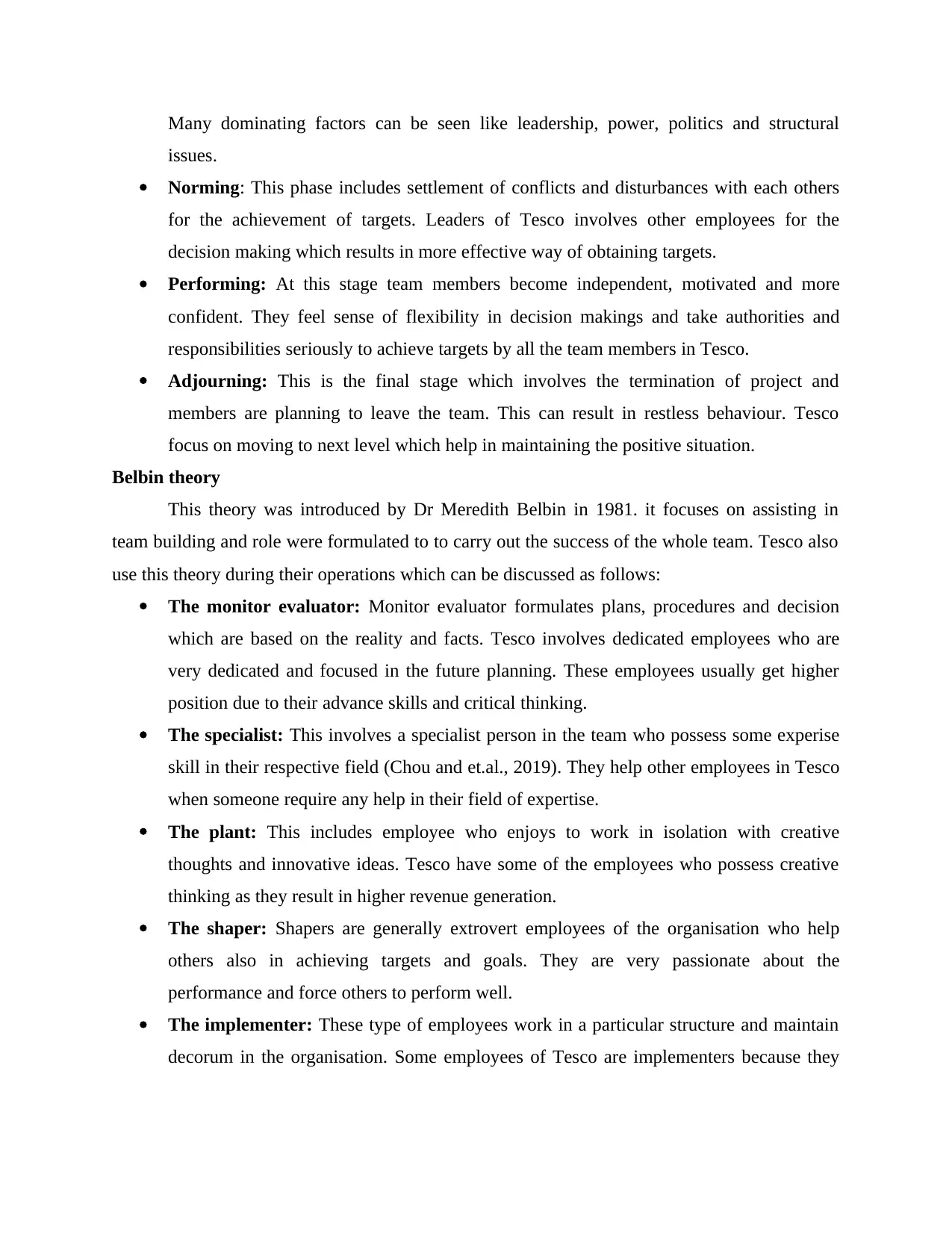
Many dominating factors can be seen like leadership, power, politics and structural
issues.
Norming: This phase includes settlement of conflicts and disturbances with each others
for the achievement of targets. Leaders of Tesco involves other employees for the
decision making which results in more effective way of obtaining targets.
Performing: At this stage team members become independent, motivated and more
confident. They feel sense of flexibility in decision makings and take authorities and
responsibilities seriously to achieve targets by all the team members in Tesco.
Adjourning: This is the final stage which involves the termination of project and
members are planning to leave the team. This can result in restless behaviour. Tesco
focus on moving to next level which help in maintaining the positive situation.
Belbin theory
This theory was introduced by Dr Meredith Belbin in 1981. it focuses on assisting in
team building and role were formulated to to carry out the success of the whole team. Tesco also
use this theory during their operations which can be discussed as follows:
The monitor evaluator: Monitor evaluator formulates plans, procedures and decision
which are based on the reality and facts. Tesco involves dedicated employees who are
very dedicated and focused in the future planning. These employees usually get higher
position due to their advance skills and critical thinking.
The specialist: This involves a specialist person in the team who possess some experise
skill in their respective field (Chou and et.al., 2019). They help other employees in Tesco
when someone require any help in their field of expertise.
The plant: This includes employee who enjoys to work in isolation with creative
thoughts and innovative ideas. Tesco have some of the employees who possess creative
thinking as they result in higher revenue generation.
The shaper: Shapers are generally extrovert employees of the organisation who help
others also in achieving targets and goals. They are very passionate about the
performance and force others to perform well.
The implementer: These type of employees work in a particular structure and maintain
decorum in the organisation. Some employees of Tesco are implementers because they
issues.
Norming: This phase includes settlement of conflicts and disturbances with each others
for the achievement of targets. Leaders of Tesco involves other employees for the
decision making which results in more effective way of obtaining targets.
Performing: At this stage team members become independent, motivated and more
confident. They feel sense of flexibility in decision makings and take authorities and
responsibilities seriously to achieve targets by all the team members in Tesco.
Adjourning: This is the final stage which involves the termination of project and
members are planning to leave the team. This can result in restless behaviour. Tesco
focus on moving to next level which help in maintaining the positive situation.
Belbin theory
This theory was introduced by Dr Meredith Belbin in 1981. it focuses on assisting in
team building and role were formulated to to carry out the success of the whole team. Tesco also
use this theory during their operations which can be discussed as follows:
The monitor evaluator: Monitor evaluator formulates plans, procedures and decision
which are based on the reality and facts. Tesco involves dedicated employees who are
very dedicated and focused in the future planning. These employees usually get higher
position due to their advance skills and critical thinking.
The specialist: This involves a specialist person in the team who possess some experise
skill in their respective field (Chou and et.al., 2019). They help other employees in Tesco
when someone require any help in their field of expertise.
The plant: This includes employee who enjoys to work in isolation with creative
thoughts and innovative ideas. Tesco have some of the employees who possess creative
thinking as they result in higher revenue generation.
The shaper: Shapers are generally extrovert employees of the organisation who help
others also in achieving targets and goals. They are very passionate about the
performance and force others to perform well.
The implementer: These type of employees work in a particular structure and maintain
decorum in the organisation. Some employees of Tesco are implementers because they
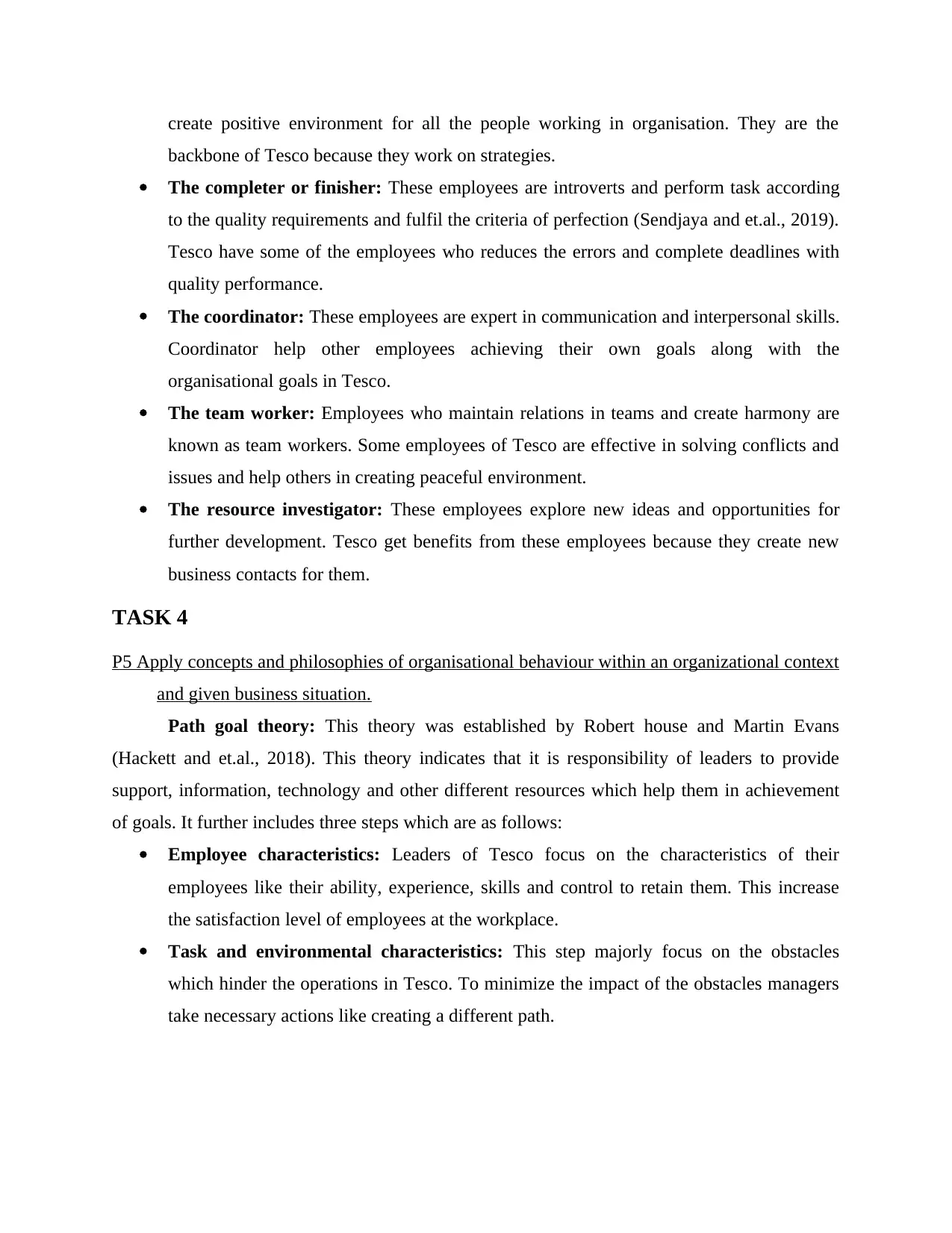
create positive environment for all the people working in organisation. They are the
backbone of Tesco because they work on strategies.
The completer or finisher: These employees are introverts and perform task according
to the quality requirements and fulfil the criteria of perfection (Sendjaya and et.al., 2019).
Tesco have some of the employees who reduces the errors and complete deadlines with
quality performance.
The coordinator: These employees are expert in communication and interpersonal skills.
Coordinator help other employees achieving their own goals along with the
organisational goals in Tesco.
The team worker: Employees who maintain relations in teams and create harmony are
known as team workers. Some employees of Tesco are effective in solving conflicts and
issues and help others in creating peaceful environment.
The resource investigator: These employees explore new ideas and opportunities for
further development. Tesco get benefits from these employees because they create new
business contacts for them.
TASK 4
P5 Apply concepts and philosophies of organisational behaviour within an organizational context
and given business situation.
Path goal theory: This theory was established by Robert house and Martin Evans
(Hackett and et.al., 2018). This theory indicates that it is responsibility of leaders to provide
support, information, technology and other different resources which help them in achievement
of goals. It further includes three steps which are as follows:
Employee characteristics: Leaders of Tesco focus on the characteristics of their
employees like their ability, experience, skills and control to retain them. This increase
the satisfaction level of employees at the workplace.
Task and environmental characteristics: This step majorly focus on the obstacles
which hinder the operations in Tesco. To minimize the impact of the obstacles managers
take necessary actions like creating a different path.
backbone of Tesco because they work on strategies.
The completer or finisher: These employees are introverts and perform task according
to the quality requirements and fulfil the criteria of perfection (Sendjaya and et.al., 2019).
Tesco have some of the employees who reduces the errors and complete deadlines with
quality performance.
The coordinator: These employees are expert in communication and interpersonal skills.
Coordinator help other employees achieving their own goals along with the
organisational goals in Tesco.
The team worker: Employees who maintain relations in teams and create harmony are
known as team workers. Some employees of Tesco are effective in solving conflicts and
issues and help others in creating peaceful environment.
The resource investigator: These employees explore new ideas and opportunities for
further development. Tesco get benefits from these employees because they create new
business contacts for them.
TASK 4
P5 Apply concepts and philosophies of organisational behaviour within an organizational context
and given business situation.
Path goal theory: This theory was established by Robert house and Martin Evans
(Hackett and et.al., 2018). This theory indicates that it is responsibility of leaders to provide
support, information, technology and other different resources which help them in achievement
of goals. It further includes three steps which are as follows:
Employee characteristics: Leaders of Tesco focus on the characteristics of their
employees like their ability, experience, skills and control to retain them. This increase
the satisfaction level of employees at the workplace.
Task and environmental characteristics: This step majorly focus on the obstacles
which hinder the operations in Tesco. To minimize the impact of the obstacles managers
take necessary actions like creating a different path.
⊘ This is a preview!⊘
Do you want full access?
Subscribe today to unlock all pages.

Trusted by 1+ million students worldwide
1 out of 16
Related Documents
Your All-in-One AI-Powered Toolkit for Academic Success.
+13062052269
info@desklib.com
Available 24*7 on WhatsApp / Email
![[object Object]](/_next/static/media/star-bottom.7253800d.svg)
Unlock your academic potential
Copyright © 2020–2026 A2Z Services. All Rights Reserved. Developed and managed by ZUCOL.


